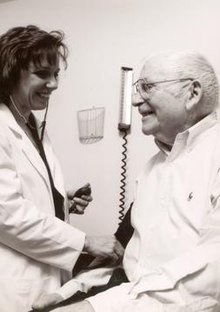
A primary care physician (PCP) is a physician who provides both the first contact for a person with an undiagnosed health concern as well as continuing care of varied medical conditions, not limited by cause, organ system, or diagnosis. The term is primarily used in the United States. In the past, the equivalent term was 'general practitioner' in the US; however in the United Kingdom and other countries the term general practitioner is still used. With the advent of nurses as PCPs, the term PCP has also been expanded to denote primary care providers.
A core element in general practice is continuity that bridges episodes of various illnesses. Greater continuity with a general practitioner has been shown to reduce the need for out-of-hours services and acute hospital admittance. Furthermore, continuity by a general practitioner reduces mortality.[1]
All physicians first complete medical school (MD, MBBS, or DO). To become primary care physicians, medical school graduates then undertake a postgraduate training in primary care programs, such as family medicine (also called family practice or general practice in some countries), pediatrics or internal medicine. Some HMOs consider gynecologists as PCPs for the care of women and have allowed certain subspecialists to assume PCP responsibilities for selected patient types, such as allergists caring for people with asthma and nephrologists acting as PCPs for patients on kidney dialysis.
Emergency physicians are sometimes counted as primary care physicians. Emergency physicians see many primary care cases, but in contrast to family physicians, pediatricians and internists, they are trained and organized to focus on episodic care, acute intervention, stabilization, and discharge or transfer or referral to definitive care, with less of a focus on chronic conditions and limited provision for continuing care.
- ^ Sandvik, Hogne; Hetlevik, Øystein; Blinkenberg, Jesper; Hunskaar, Steinar (2022). "Continuity in general practice as predictor of mortality, acute hospitalisation, and use of out-of-hours care: A registry-based observational study in Norway". British Journal of General Practice. 72 (715): e84–e90. doi:10.3399/BJGP.2021.0340. PMC 8510690. PMID 34607797.
